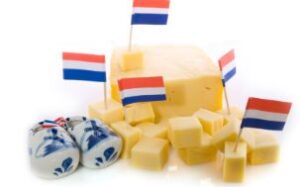At first sight, the Dutch appear to be like other normal Europeans. But those of you who have lived here longer and have worked with the Dutch, will have found dramatic differences. In order to avoid irritations or surprises, it might be good to know a little more about Dutch culture. In these paragraphs, a short overview of the twelve principles or values that rule Dutch society, from politics, work, and school to the most intimate parts of family life.
The first four values come straight from Christianity:
- SALVATION Your sacrifices and efforts will be rewarded in the future
- GUILT You are responsible for the good and the bad things that are the consequences of your acts
- LOVE THY NEIGHBOUR You should be concerned about the wellbeing of others
- TRUTH You should always telle the bare facts
In the first place, the Dutch, just as other people who live in Christian cultures, are strongly oriented towards the future. Progress and innovation are important issues. Secondly, they are always worrying whether they did things right or wrong. The degree of personal responsibility is high. Thirdly, the Dutch feel greatly involved with people who have troubles, or who are suffering – whether close to home or on the other side of the world. This is evident from the country’s extensive social security system and its high budget for development aid. Fourthly, the Dutch put a lot of stock in the objective truth and the bare facts. They find it more important to tell someone else exactly what they think than to be polite.
The next five values follow from Protestantism:
5. WORK It is good to work
6. ORDER & TIDINESS You should be well organized
7. UTILITY Everything you do, should have a purpose, you may not waste
8. RELIABILITY You must do what you said or promised
9. MODERATION You must exercise self-control, and must not overdo
The Dutch think that it is better to work than to sit by idly. The higher they are on the corporate ladder, the harder they work. They appreciate an organized life that is dictated by the clock and their agenda, and think that a house should be neat and clean. The Netherlands is a relatively clean and neat country, in which a lot of big and little rules tell you how to behave. Also abroad, the Dutch are known for their stinginess. One thing is certain; they hate waste; of time, money or anything else. Don’t be surprised if they ask you what purpose your proposal serves. Couldn’t it be done more efficiently, or perhaps more effectively? The Dutch are very literal about their agreements and promises, and if you agree to something, then you must actually do it, or they will conclude that you are unreliable (which is a heavy disgrace). In daily life the Dutch hate extremes and exaggeration, they applaud self-restraint and frown on expressing strong emotions. Only under certain conditions (a football match, carnival, at a disco), do they ever let it rip.
All this might sound pretty familiar to people from other Christian or Protestant countries. But the difficult thing is still to come. The last three values are typically Dutch and explain why certain things are done differently here or are found to be different than they are in the surrounding countries.
10. CONSENSUS You should always try to compromise
The Dutch dislike conflict and aggression, and consistently strive for consensus and harmony, which they refer to affectionately as gezelligheid. They devote quite a bit of time to meetings and discussions, in order to make sure that all disagreements have been resolved. Instead of letting the democratic majority rule the minority, they prefer to find a solution that appeals to everyone; a compromise. A compromise that everyone will then stick to, for fear of conflict. This is often referred to as the poldermodel. Consequently, the Netherlands has a relatively peaceful, non-violent society, in which strikes end rather quickly in compromise and the police apply a de-escalating approach to handle skirmishes.
So what was going on the last ten years or so, when so many Dutch gave heed to the call of radical politicians such as Fortuyn and Wilders and started agitating harshly against immigrants in general and Muslims in particular? Precisely because the political elite had spent years ignoring certain problems and societal discontent, for fear of uncomfortable discussions, the camel’s back had to break one day. And when this happens, also the goody-goody Dutch can become aggressive and unreasonable. Luckily, the situation has changed again, measures have been taken to deal with the problems and most Dutchmen have resumed their normal, peacful and consensus-oriented attitude.
11. EQUALITY You should not think that you are more important than anyone else
In the Netherlands, all hierarchy and differences in social status are carefully smoothed over and disguised. It is painful to give direct instructions to someone who is under you, such as your cleaning lady. You can’t just say: “Daisy, clean up the kitchen and the bathroom!” To the Dutch this is a brusque order against which they will rebel immediately. Instead, they formulate it a as polite request: “Would you perhaps be willing to do the kitchen and the bathroom today?” It sounds like a suggestion, but to the Dutch, it feels like an order. The Dutch do not apply politeness to superiors, but rather reverse politeness towards inferiors. You must, at all cost, avoid the impression that you think you might be superior to the other (even if you are a Minister or have won the Nobel prize). It is perfectly easy to manage the Dutch, provided you treat them as equals and disguise every instruction as a friendly request.
The Dutch are allergic to people who toot their own horn; they expect a certain modesty and if you fail to act like a ‘normal’ person, then you will be mowed down. You are not only not allowed to be openly proud of your achievements, the same applies to being proud of your country and its history. To many Dutch, nationalism is a cardinal sin. This is not to say that the Dutch are not proud of their country, they just cannot say so openly.
12. SELF-DETERMINATION I will decide what I do, not my father, boss or the government.
The Dutch find it more important that people can make their own choices, than that they are told what to do. They say: Everyone should decide for themselves what to do, as long as it doesn’t interfere with my life. This is the basis for Dutch tolerance: It is not so much that they have sympathy for people who think differently, as that they are pragmatic; if you leave me alone, I will leave you alone. This explains why the Dutch tolerate the use of soft drugs, abortion, and euthanasia. It does not so much mean that they apply these themselves, but rather that they feel that whether or not someone else does, is their personal choice and none of anyone’s business. This explains why so many different lifestyles can coexist in such a small country, from extravagant gay people who marry, to black-clad orthodoc protestants who go to church three times every Sunday.
Children are not so much raised to respect their elders or general moral principles – but to think for themselves and to speak for themselves. Dutch employees are expected to demonstrate a high degree of responsibility and initiative. Do take into account that all Dutch people, be they yound or old, have an opinion on everything and want to be heard. After which they call a meeting to reach a compromise!
(Published in the Holland Handbook, Scriptum: Schiedam)




